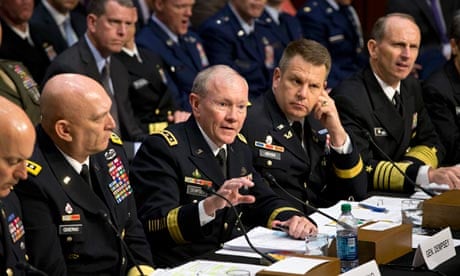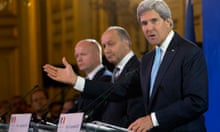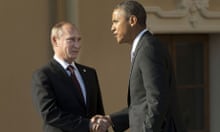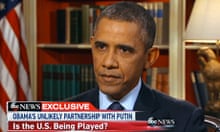As soon as the debate began on military intervention in Syria, some members of Congress stood up to demand a bigger Pentagon budget. Without even knowing how much the "limited strike" might cost – from $100 million to $500 million, these representatives were immediately sure that the Pentagon would need more dollars.
Actually, money isn't the problem. Within the Pentagon's 2013 budget of $600bn – even under the requirements of sequester – there is plenty of room to fund the "limited strikes" or even a year-long action as described by General Dempsey, chair of the joint chiefs of staff. Even under the sequester law, and after accounting for inflation, the Pentagon now spends about what it spent at the height of the Vietnam war, and close to its peak spending on the Cold War. There is room for adjustments, re-programming, better choices, and savings, but we are hardly in a military budget crisis.
Congress and the Pentagon have choices. For Fiscal Year 2014, the sequester law allows appropriators and agencies to exercise flexibility within their allocations – Congress and the Pentagon can choose to fund the most important programs and projects, and delay or defund whatever is less important. For example:
The Pentagon could delay and divert some of its planned spending on the F-35 joint strike fighter (pdf), the most expensive weapons system in US history. The cost of one plane, at $162m, would likely be enough to fund the "limited strike" that the president originally described. In 2013, the Pentagon is spending $6.18bn on the joint strike fighter program – enough to allow for some flexibility.
Congress could agree not to push additional, unneeded funding on the Pentagon for the production of more M1 Abrams tanks, an investment that the Pentagon did not request and does not want. The extra $236m for these new tanks (in FY14) could easily cover the high estimate of the cost of the president's "limited strike" proposal with $36m left over to invest in creating new jobs in the city of Lima, Ohio where a General Dynamics plant produces the tanks.
Congress could save $14bn – enough to take on the entire job of removing chemical weapons from Syria – by foregoing a 12th aircraft carrier, commissioned to be built by Huntington Ingalls, which is still trying to finish the 11th carrier – already the most expensive warship ever built. Does the US need another aircraft carrier? The country already has 10.
Given the small cost of military action in Syria, relative to the impressively large costs of weapons and weapons systems, in addition to billions wasted on faulty contracting and bookkeeping practices in the Pentagon, there's no need for Congress to consider adjusting or setting aside the modest limits imposed on Pentagon spending by the sequester.
What would be more effective and even less expensive? Don't attack Syria. Work with the 189 other parties to the Chemical Weapons Convention to get the chemical weapons removed from Syria. Talk with Russia, Iran, and China – countries that expressed willingness to ensure accountability under international law. Explore a high-level strategy with the League of Arab States and the Organization for Islamic Cooperation, political entities that encompass all Muslim-and-Arab majority nations and have leverage over parties to the Syrian civil war. Broaden the debate with the UN General Assembly and the UN Security Council to engage with international partners to ensure that standards of international law are upheld.
The world does need to respond to the use of chemical weapons, but the world does not need another war.









